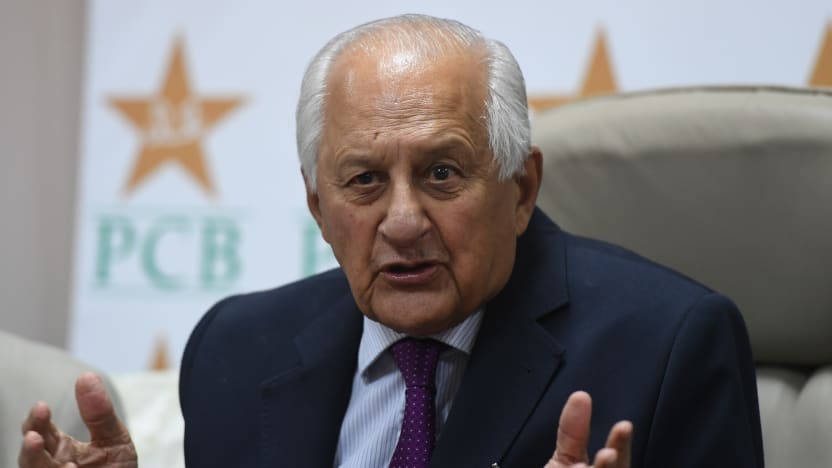
Rahul Dravid’s monumental 270 had led India to a famous series victory in Rawalpindi – India’s first in Pakistan – and less than an hour later, he fronted up to the media. At the back of a room, a distinguished looking man stood in a corner and listening. Once or twice, he nodded his head in approval as Dravid spoke. Minutes later, after Dravid had gone back to the team celebrations, this man spoke to a few of the Indian media persons who were still hanging around.
“What a wonderful ambassador he [Dravid] is for your country,” said the man. “He’s so articulate and speaks with such clarity. Players like this are a credit to the sport. I hope my players watch him and learn from him.”
The gentleman in question was Shaharyar Khan, a career diplomat who was the Pakistan Cricket Board (PCB) chairman at the time. His words couldn’t be heard in isolation either. Inzamam-ul-Haq, Pakistan’s captain, had also spoken to the press, an interaction that had been notable for him almost accusing Shoaib Akhtar of faking injury. Whatever he thought of Shoaib and his antics during that series, Shaharyar also took a dim view of Inzamam throwing a teammate under the bus to try and protect his position.
In the two years that followed, with the inspirational Bob Woolmer as coach, Shaharyar and the team management revived a side that had plumbed the depths. In 2005, Pakistan came to India and drew the Test series with a shock victory in Bengaluru. And magnificent centuries from Inzamam in Ahmedabad and Shahid Afridi (45 balls) in Kanpur ensured that they won the ODI series 4-2. Less than a year later, they would beat India 1-0 over three Tests at home, though India would win the ODI series 4-1.
Shaharyar would resign later that year, not long after the Oval Test forfeit fiasco. He would return for another three-year stint in 2014, a period now remembered for the launch of the Pakistan Super League (PSL). That helped keep the board solvent at a time when foreign teams refused to tour Pakistan because of security concerns.
The whole world seemed to be watching when India took on Pakistan on the outskirts of New York City. RevSportz’ Debasis Sen was there to capture the best moments from a much-anticipated clash that lived up to all the hype.#INDvPAK
✍️@debasissen https://t.co/A26PqxOgXt
— RevSportz (@RevSportz) June 11, 2024
Anyone who ever interacted with Shaharyar during his spells in charge could tell you of his transparent love for the game. Unlike so many other opportunists and political appointments, he was a cricket-lover capable of seeing the bigger picture. People in India also had first-hand experiences of this.
When Pakistan toured in 1999, their first series across the border since 1987, they played a warm-up game in Kochi. After the match, Shaharyar insisted that the entire squad go to Fort Kochi and spend time at a school for kids with multiple disabilities. Scoring runs and taking wickets mattered, but so did presenting Pakistan cricket in the right light.
There have been other administrators with vision and heart too – Air Marshal Nur Khan and Arif Abbasi come to mind. But with Pakistan cricket at a new low after defeat to the USA at the ongoing T20 World Cup, the spotlight once again switches back to the administration.
Who signed off on this unbalanced squad, with at least two dubious picks in there? How exactly will Gary Kirsten, the new coach, be empowered to turn things around? Will he be able to do his job without the constant musical chairs and political interference that has already buried Pakistan hockey?
The captaincy is not just a poisoned chalice, it’s become a joke after Shaheen Shah Afridi was replaced as T20 skipper just five games into his tenure. That the job went back to Babar Azam, who has all the leadership qualities and charisma of a shoebox, was even more bizarre. If, as Wasim Akram suggested, Babar and Shaheen don’t even talk to each other, that is another huge failure at board level.
Yes, it wasn’t a PCB official that played the ugly hoick to Jasprit Bumrah that cost Pakistan Sunday’s game. It wasn’t the board that bowled and fielded like a school team in the Super Over against USA. But the rot always starts at the top, and an underperforming team is just a symptom of a system or structure that doesn’t work.
No Kirsten can fix that. It needs someone of stature leading the board. Where is the next Shaharyar?
Why do Pakistan become the Buffalo Bills whenever they play India? And just how good is Jasprit Bumrah, whose two overs at the death included seven dot balls and two wickets?#T20WorldCup2024 https://t.co/fk79Hz6bsI
— RevSportz (@RevSportz) June 10, 2024